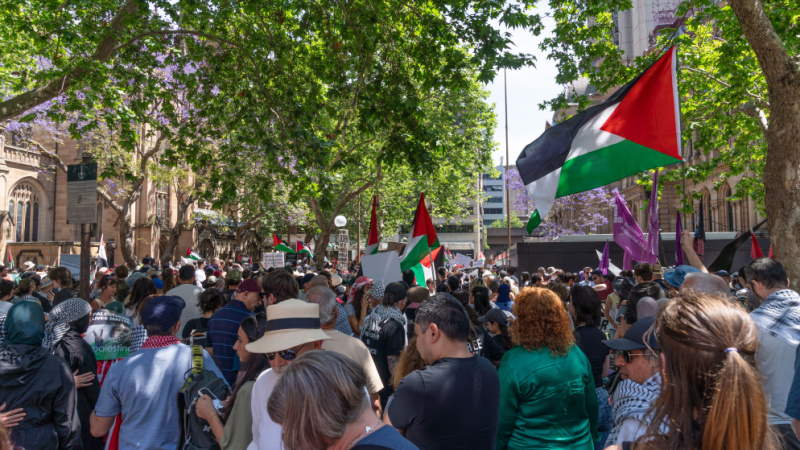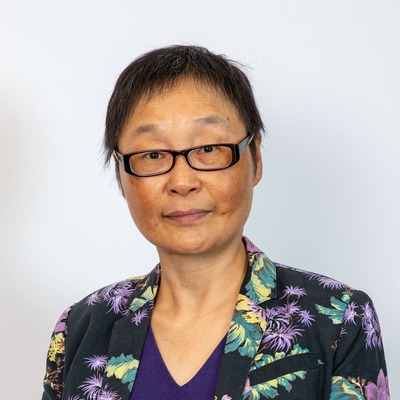Chinese Australians’ reaction to Gaza crisis framed by cultural, community concerns
January 22 2024

By Wanning Sun
Note: This article appeared in Crikey on January 22 2024.
In the wider Australian community, we have witnessed a spectrum of engagement on the current conflict in Gaza. Among the silent, disengaged majority, we have a significant proportion of the population who are, to varying degrees, concerned and prepared to think about or even debate the issue. Some may have adopted a clear position; others may feel torn.
Many believe the situation is too protracted and complex to see any clear and imminent solution. Others may choose to tune out because the daily news is just too depressing for their mental health. Many may be too preoccupied with having to survive the more immediate challenges of high rents, long working hours, mortgage stress, and the rising cost of living.
While we might be bold enough to hazard a guess as to the dominant views among Australia’s Jewish and Palestinian/Arab diaspora communities, what is less well-known is how Australia’s numerous other diaspora groups have reacted to the ongoing situation in Gaza.
Like the wider Australian society, first-generation Chinese Australians from the People’s Republic of China (PRC) have reacted to the ongoing conflict in polarised ways. Most seem to condemn Hamas for the brutal terrorist attack on October 7, and many have expressed compassion for the civilian casualties, especially on the Palestinian side.
However, people in this community seem divided about whether Israel is morally justified in what has been widely characterised as a disproportionate reaction to the attack, and about what is the best solution to the wider and intractable problem of which recent events are the most recent and tragic demonstration.
On the whole though, PRC migrants seem much less engaged with the Israel-Hamas war than with recent elections and the Voice to Parliament referendum. For instance, you’re not likely to see many people from this community in the regular Saturday pro-Palestine rallies in Sydney’s Hyde Park, or signing open letters protesting against media bias against Palestinians. Nor are you likely to see attempts at mobilisation from leaders of this community. There’s little evidence of championing for either side in Chinese-language media outlets of all kinds, despite individuals having been freely and often strongly expressing their views on social media.
Moreover, there is no clear evidence to suggest that this community looks to either the Australian or the Chinese government for guidance in forming their views on this issue. The reasons for such a relatively muted response are numerous: some seem to coincide with ‘mainstream’ thinking; others are culture-specific.
One reason for this low level of engagement could be the perceived lack of relevance to PRC migrants’ daily lives. As a Sydney-based political scientist who is himself a PRC migrant told me: ‘The conflict is largely irrelevant to them. They aren’t on either side. To put it another way, they aren’t emotionally or morally committed to either side. They don’t have to take sides.’
By contrast, when it involves tensions between Hong Kong and the PRC, or between Taiwan and the PRC, or taking a stance in relation to Tibet and the Uyghurs, people in Australia’s PRC community find themselves gravitating towards one side or the other. Drawing on their own experience of having to live with unfavourable mainstream media coverage of their motherland, this community knows first-hand that for people with Jewish heritage or Palestinian/Arab heritage, regardless of their position, their reaction to what Penny Wong, the media and Twitter punters say can be highly emotionally charged, personally invested, and often deeply affecting.
Another contributing factor could be a possible cognitive dissonance in their perception of Israel. China was one of the places that welcomed Jewish refugees during World War II. China doesn’t forget that Israel is one of the first countries that recognised China. The Chinese people are known to look up to Jewish people for their intellectual achievements, their work ethic, and their cultural and scientific contributions to the world.
A Melbourne-based woman, who is active in helping fellow PRC migrants, attributes this to
a Confucianist tendency to look up to successful people. [But] as the current Israeli government’s military attacks in Gaza became increasingly disproportionate, leading to the deaths of so many Palestinian civilians, this challenged their previous view of Israel as a civilised modern Western democracy.
One reason for a low level of engagement this community may share with the wider Australian society is that they’re weighed down by everyday challenges — cost-of-living increases, kids’ education, job security, etc — that leave them with little time or energy to invest in learning about the complex history and moral intricacy of the Israel–Palestine conflict.
As a businessman and community leader in Sydney’s Strathfield puts it:
People are already too exhausted by their daily struggles to worry about what’s happening on the other side of the planet. Sure, some people are concerned, but what difference is expressing their concern going to make?
Another underlying reason seldom articulated may be that, as new migrants, these individuals are yet to acquire what sociologist Ghassan Hage calls ‘governmental belonging‘ — a sense of having the right to contribute to the governing of the nation (even if only by having a legitimate opinion about how the nation is run). Instead, their sense of belonging is more akin to what Hage calls ‘passive belonging’, referring to ‘fitting in’, or ‘feeling at home’.
Indeed, recent survey data reveal a widespread feeling among PRC migrant respondents that their community tends to be mistrusted, misunderstood and misinterpreted by the Australian English-language media. Around six in 10 (63 percent) of PRC migrants reported feelings of powerlessness in relation to having their voices heard by the media.
This feeling of still not being included manifests itself as a lack of confidence that their opinions matter.
For instance, an Adelaide-based retired businessman who left China many years ago shared the following comment:
Now that Israel is involved in a conflict, the entire Jewish community in Australia has got involved in rallies and protests. And many mainstream media have given voice to their sentiments. Our government has even put aside money to assist them, as well as the Palestinian communities. In contrast, we don’t dare to complain or speak out when we are attacked by racists. We don’t dare to criticise Australia for fear of having our loyalty questioned. People who dare to talk about China positively in one WeChat group are told not to do so anymore, since they’re now Australians and should only be praising Australia. Does this contrast call for some self-reflection?
As a result of this lack of confidence about their place in society, these new migrants do their best to ‘fit in’ rather than complain or criticise. The same commentator says:
The Jewish people in Australia are mostly second or even third generation. Even though they are Australian citizens, they’re proud of their heritage, and are always keen to keep their Jewish identity. In contrast, people in our community seem to be in self-denial. They so desperately want to show that they have blended in.
This relatively muted response does not mean that people in this community have no political agency. There was, for instance, a high level of engagement during the recent Voice referendum, the 2022 federal election and subsequent state elections. This active engagement suggests they would not hesitate to advocate for the political party they believed could best protect their interests if the matter at stake was important enough to them.
Like members of the wider Australian community, how first-generation migrants from the PRC respond to the Gaza situation seems to say a lot about their cultural preoccupations, sense of insecurity, and their perception of the social status of their community.
Professor Wanning Sun is Deputy Director at UTS:ACRI and a Professor of Media and Communication in the Faculty of Arts and Social Sciences at UTS.

